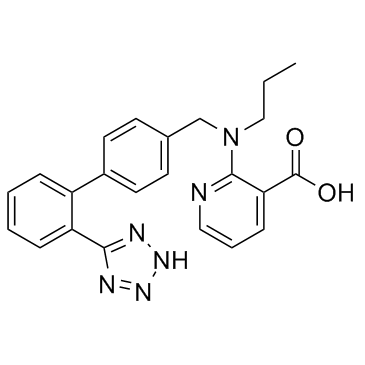A81988 (Abbott81988) (Synonyms: Abbott81988) |
| رقم الكتالوجGC32674 |
A81988 (Abbott81988) هو مضاد قوي ، تنافسي ، غير هضمي لمستقبلات أنجيوتنسين AT1.
Products are for research use only. Not for human use. We do not sell to patients.

Cas No.: 141887-34-5
Sample solution is provided at 25 µL, 10mM.
A81988 is a potent, competitive, non-peptidic antagonist of angiotensin AT1 receptors.
A81988 (A-81988) is labeled with tritium to high specific activity (16 Ci/mmol) and radioligand binding assays performed in rat liver membranes. [3H]A81988 binds with high affinity (KD=0.57 nM) and the KD determined from kinetics assays is similar. Non-specific binding (defined with 1 μM angiotensin-II) is very low (< 6% at the KD). The binding of [3H]A81988 is competitive and exhibits appropriate pharmacological specificity for compounds acting at angiotensin AT1 receptors[1].
To verify this hypothesis, B2-/- or wild-type mice (B2+/+) are administered a nonpeptide antagonist of Ang II type 1 (AT1) receptors (A81988) from conception through 180 days of age. Untreated B2+/+ and B2-/- served as controls. Blood pressure (BP) and heart rate are monitored with the use of tail-cuff plethysmography at regular intervals. Ventricular weights, diameters, wall thickness, chamber volume, and myocardial fibrosis are measured at 40 and 180 days. No differences are observed in BP, heart rate, and cardiac weight and dimensions between treated and untreated B2+/+. The BP of AT1 antagonist-treated B2-/- is reduced until 70 days; then, it increases to the levels found in untreated B2-/-. AT1 receptor blockade results in a reduction in left ventricular mass, chamber volume, and wall thickness and abrogated myocardial fibrosis in B2-/-[2]. A81988 (A-81988) decreases the BP of Bk2r-/- either in normosodic conditions or after sodium deprivation, whereas in Bk2r+/+ it produces a modest decrease under hyposodic conditions only[3].
[1]. Hancock AA, et al. [3H]A-81988, a potent, selective, competitive antagonist radioligand for angiotensin AT1 receptors. Eur J Pharmacol. 1994 Mar 15;267(1):49-54. [2]. Madeddu P, et al. Angiotensin II type 1 receptor blockade prevents cardiac remodeling in bradykinin B(2) receptor knockout mice. Hypertension. 2000 Jan;35(1 Pt 2):391-6. [3]. Madeddu P, et al. Circulation. 1997 Nov 18;96(10):3570-8.
Average Rating: 5 (Based on Reviews and 8 reference(s) in Google Scholar.)
GLPBIO products are for RESEARCH USE ONLY. Please make sure your review or question is research based.
Required fields are marked with *




















